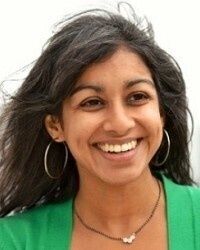
Sonali McDermid | Eating Our Cake Without Losing It: Exploring Sustainability in Agriculture and Food Security With Land Modeling
Abstract: Global agriculture has transformed ~40% of Earth’s land surface, consuming copious inputs including water, fertilizer, and land. While we are currently producing more than we ever have, this has not meant food and nutrition security for all, furthermore, agriculture and associated land use is now major contributor to climate change, exceedance of biogeochemical flows, biodiversity loss, and water over-extraction. By the same token, climate change and extremes increasingly threaten agriculture and food security. In response to these challenges, interest in sustainable food system transformations is growing, and a large emphasis has been placed on improving agricultural production. Emerging efforts (and carbon markets) are even pursuing agriculture as a “nature-based” climate solution via increasing soil and agroecosystem carbon sequestration. Land systems modeling is a crucial tool for understanding agriculture as both a driver of global environmental change as well as its vulnerabilities to these changes. Both must be better understood – and better modeled – in order to meet the combined goals of global food security and global environmental change mitigation into the future. My talk will provide a brief overview of agriculture-Earth systems interactions and identify key questions for modeling agriculture in a land and Earth systems framework. In doing so, I will flag key outstanding uncertainties on which future research is needed and highlight important efforts for coordinated and cross-disciplinary Earth system modeling centered around agriculture and land use.
Bio: Sonali McDermid is an Associate Professor in the Dept. of Environmental Studies at NYU. Her research focuses on understanding both climate change impacts on agriculture and food security, and the impacts of agriculture on the environment. She is a Climate Co-Lead for the Agricultural Intercomparison and Improvement Project (www.agmip.org), evaluating climate change impacts on food security and livelihoods across South Asia and Sub-Saharan Africa. She is also affiliated with the NASA Goddard Institute for Space Studies, where she works to improve the representation of agricultural land management in the NASA GISS ModelE. She is a recent Andrew Carnegie Fellow (2021) and Fulbright-Kalam Fellow awardee (2020), which supports her work looking at the intersection of climate mitigation and adaptation in agriculture. She holds a B.A. in Physics from NYU, and a Masters and Ph.D. from the Dept. of Earth and Environmental Sciences at Columbia University, focusing on Atmospheric Science and Climatology. Prior to NYU, she was NASA Postdoctoral Fellow at the Goddard Institute for Space Studies in NYC. She currently serves as Editor-in-Chief of AMS Earth Interactions.
This event is presented as part of the 2023 Perspectives on the Climate Change Challenge Seminar Series:
Most Mondays, Spring Semester 2023, 2:45-4:00pm(via Zoom OR In person in 155 Olin Hall)This university-wide seminar series is open to the public, and provides important views on the critical issue of climate change, drawing from many perspectives and disciplines. Experts from Cornell University and beyond present an overview of the science of climate change and climate change models, the implications for agriculture, ecosystems, and food systems, and provide important economic, ethical, and policy insights on the issue. The seminar is being organized and sponsored by the Department of Biological and Environmental Engineering and Cornell Atkinson Center for Sustainability.